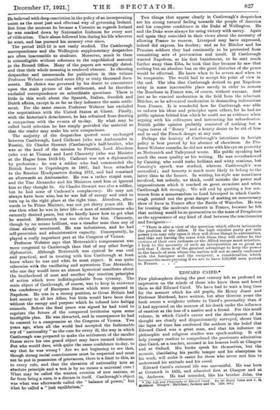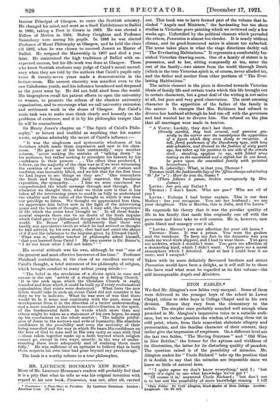EDWARD CAIRD.*
Few philosophers during the past century left so profound an impression on the minds of those who knew them and heard them as did Edward Caird. We have had to wait a long time for the memoir which his old pupils, Sir Henry Jones and Professor Muirhead, have written, but after thirteen years the book seems a weightier tribute to Caird's personality than if it had appeared on the morrow of his death under the influence of emotion at the loss of a master and a friend. For this small volume, in which Caird's career and the development of his thought are clearly and dispassionately surveyed, shows that the lapse of time has confirmed the authors in the belief that Edward Caird was a. great man, and that his influence on philosophic and religious studies was epoch-making. It will help younger readers to comprehend the passionate admiration that Caird, as a teacher, aroused in his hearers both at Glasgow and at Oxford. His books speak for themselves, but the memoir, elucidating his pacific temper and his absorption in his work, will make it easier for those who never met him to understand his attitude and his creed.
Edward Caird's external life was uneventful. He was born at Greenock in 1835, and educated first at Glasgow and at St. Andrews. He had intended, like his brother John, the
• The Life and Philosophy of Edward Cain!. By Sir Henry Jones and J. H. Mukhead. Glasgow : Hactehose, Jackson and Co. 1251. [Iota
famous Principal of Glasgow, to enter the Scottish ministry. He changed his mind, and went as a Snell Exhibitioner to Balliol in 1860, taking a First in Greats in 1863. He was elected a Fellow of Merton in 1864. Bishop Creighton and Professor Saintsbury were among his pupils. In 1866 he was elected Professor of Moral Philosophy at Glasgow, and he held the chair till 1893, when he was chosen to succeed Jewett as Master of Balliol. He resigned the Mastership in 1907 and died a year later. He maintained the high traditions of Balliol with un- expected success, but his life-work was done at Glasgow. Those who know Scottish students may judge of Caird's moral ascend- ancy when they are told by the authors that Caird's pupils only twice iii twenty-seven years made a demonstration in the lecture-room. His earnest sincerity was manifest even to the raw Caledonian youth, and his influence broadened and deepened as the years went by. He did not hold aloof from the world. His biographers recall his patient efforts to open the university to women, to promote the reform of the obsolete university organization, and to encourage what we call university extension and settlement work in the slums of Glasgow. But Caird's main task was to make men think clearly and honestly on the problems of existence, and it is by his philosophic temper that he will be remembered.
Sir Henry Jones's chapter on " The Spirit of Caird's Philo- sophy," as honest and truthful as anything that his master wrote, explains admirably the secret of Caird's influence :-
" It was the singleness and systematic wholeness of his doctrines which made them impressive and new in his class- room. ' He gave us of his best unstintedly,' says another witness, ' never making the mistake of " talking down " to his audience, but rather seeking to stimulate his hearers by his confidence in their powers. . . . The effect thus produced, I believe, on the majority of the class was as if we were witnessing the creation of a new world. The deadweight of custom and tradition was insensibly lifted, and we felt that for the first time we had begun to see things as they are.' One remembers the fresh and living thought daily renewed, the luminous expedition, the sympathy. . . . I fear we were convinced we comprehended the whole message through and through. But whatever we thought then, what we think now is that it has taken all the intervening years to enable us fully to understand the vitality and the value of the thought to which it was then our privilege to listen. We thought we appreciated him then, we appreciate him better now in the light of the intervening years and the hours of thought, and, I may add, the experience of life which the years have brought us.' In all these funda- mental respects there can be no doubt of the fresh impulse which Caird gave to philosophic thought in the English-speaking world. Dr. Boner ' affirmed deliberately that there was hardly any speculative truth at which he had arrived or thought he had arrived, by his own study, that had not owed the shape of it if not the substance to the impulse given by Edward Caird.' ' What was it,' another teacher of philosophy asked himself, that you learned from Caird ? My own answer is Dr. Boner's, " I do not know what I did not learn." ' "
His mental attitude was his own, although he was " one of the greatest and most effective borrowers of his time." Professor Muirhead contributes, at the close of an excellent survey of Caird's thought, a brief statement of his philosophy of religion, which brought comfort to many ardent young minds :-
" The belief in the revelation of a divine spirit in man and nature is the one article of a standing or a falling Church.' ' It is the rock upon which the Christian Church is really founded and from which it could be built up if every ecclesiastical organization that exists were destroyed.' What form the new fabric would take in such an event Caird did not consider it his duty to try to indicate. What he was sure of was that there would be m it some real continuity with the past, some real development from it in the direction of a better understanding, and a more resolute endeavour to mould civilization in the spirit, of the fundamental faith. In words which more than any others might be taken as a statement of his own hopes, he sums up his conclusions on the whole matter : ' The infinite pitiful. ness of Jesus to the sorrows and evils of humanity, His absolute confidence in the possibility and even the necessity of their being remedied and the way in which He bases His confidence on the love of God to man and in His own unity as man with God —these taken together make up a faith beyond which religion cannot go, except in two ways, namely, in the way of under- standing them more adequately and of realizing them more fully.' He was sufficient of an optimist to believe that in both these respects his own time had gone beyond any previous age."
The book is a worthy tribute to a true philosopher.







































 Previous page
Previous page